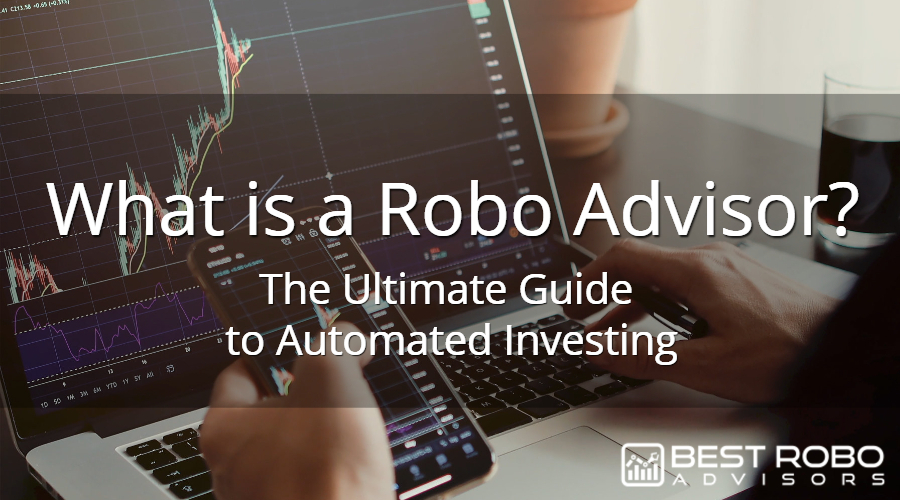We rely on automated processes every day to save time and money. It isn’t easy to imagine a time when you needed to visit your local bank before they closed on Friday afternoon to have cash on hand for the weekend. We rely on automation to adjust our thermostats shortly before arriving home, and to brew our morning coffee before even resting one foot on the floor.
Automation makes every aspect of our lives easier, and the same applies to investing. Even those embracing automation in every other corner of their lives may feel somewhat hesitant about automated investment management, and we get that.
We are here to help you understand why it is a safe strategy and a smart one. While that Roomba circles your feet to swipe up every last crumb and while Siri or Alexa announces that your home has reached the optimal temperature, you can read on to learn more about why the next robot to assist you should be making your investments.
What is a Robo Advisor?
A robo advisor is a digital financial advisor that automatically uses specialized computer algorithms to optimize your investment portfolio, with little or no input from yourself.
They almost always charge a fraction of the cost of a traditional financial advisor and use the same intelligent algorithms many financial planners use to optimize your investment portfolio.
Most robo advisors are generally restricted to investment management and retirement planning. Even though they usually don’t handle cash-flow management or estate planning (with some exceptions), their services are quickly expanding. They now have 529 college savings accounts, 401(k) management, micro-investing, saving and spending accounts, and have even started diving into more comprehensive financial planning services.
Robo advisors also provide a more flexible approach to financial planning. A beginner investor might want a fully automated, hands-off solution, while a more seasoned investor may prefer a more flexible, hands-on approach or investment advice from a Certified Financial Planner for your financial situation. Whichever you prefer, there is a robo advisor for you.
With robo advisors, you don’t need to consult an expensive human advisor or spend weeks reading hundreds of pages of confusing investor-speak. You don’t even need to know the best investment strategy for your demographic to reap high returns on both long-term and short-term investment portfolios. All the dirty work is already done for you.
Considering that a human advisor can charge an annual fee of 1-2% of total assets, a robo advisor will only cost you around 0.25% to 0.50% (some robo advisors even offer a free service). This low or no-fee service alone can save you many thousands of dollars.
What are the Best Robo Advisors on the Market?
We analyze many of the robo advisors on the market today, investing our own funds into the services, and give you an objective report on which robo advisors we determine to be the best available.
While there is no one best robo advisor for every investor (each person has their own unique risk tolerance and financial goals), we’ve found that these robo advisors are the best services available for most investors:

- Low Annual Fee (0.25%)
- $5,000 Managed Free
- Socially-Responsible Portfolios
- Very Easy to Use
- Excellent Financial Planning Tools
- Individual Stock Investing

- $4/month or 0.25% - 0.40% Annual Fee
- No Minimum Investment
- Access to Human Financial Advisors
- Excellent Banking Features
- Socially-Responsible Options
Wealthfront is one of the first robo advisors on the market and one of the cheapest and full-featured. At only a 0.25% management fee (with the first $5,000 invested being free if you use our link to sign up), Wealthfront offers an entirely hands-off approach to automated investing as well as additional features and accounts such as individual stock trading, free personal finance dashboard, a portfolio line of credit, and more. Their account minimum is only $500, which is lower than average, and their high-yield cash management account, Wealthfront Cash, currently earns a market-leading 5.0%.
Betterment’s is currently our favorite overall robo advisor for most investors. Their’s set-it-and-forget-it, hands-off approach to investing, reasonable fees, and other great financial services are what propelled them to be one of the biggest robo advisors on the planet. Their basic “Digital” service only costs a 0.25% management fee per year with a $0 minimum deposit. However, note that unless your balance is over $20,000 or you have $250 per month in automatic deposits set up, the fee will be $4 per month, which we think is pretty high for smaller investors. Their high-yield cash account currently earns a respectable 4.75% APY. Betterment also offers a hybrid robo advisor service called “Premium,” which gives you unlimited access to human advisors for a 0.40% management fee, but you have to have $100,000 invested with them to access this service.
M1 Finance straddles the line between a robo advisor and an automated brokerage account. It’s 100% free (zero fees,) and offers both completely automated hands-off investment management. It allows investors to pick and choose their investments for a more hands-on approach if that’s what you want. They also offer a free checking account called Spend with some great features and a portfolio line of credit called Borrow, offering some of the lowest rates available. The only downside of M1 Finance is that they do not provide tax-loss harvesting for taxable accounts. Their account minimum is only $100 to begin investing, and they have options for socially responsible investing through expert-made funds.
Vanguard Personal Advisor is the investment behemoth’s dive into the robo advising world. What makes them unique is their inexpensive (only 0.30%) approach to combining automated investing with access to human financial advisors. This is called a Hybrid Robo Advisor, and Vanguard PA is the best service available offering this feature. The only drawback is that the minimum investment amount is $50,000, making it suitable only for larger investors. To get around this, Vanguard also offers a service called Digital Advisor, which only requires a $3,000 account minimum and lowers the fee to 0.20% but removes access to a human financial advisor.
How do Robo Advisors Work?
The exact workings of the robo advisors differ depending on the service you choose to use. However, they generally operate on the same principles.
Most robo advisors give the investor an automated, hands-off approach to managed investing, whether you’re starting small or have larger amounts to invest.
What Happens After I Sign Up?
After signing up, you’ll be given a brief questionnaire to answer a few essential questions about your budget, investment goals, and risk tolerance. The robo advisor will suggest a portfolio composed of various stocks, bonds, mutual funds, and ETFs (exchange-traded funds). Then, you’ll need to deposit or transfer the preferred investment amount. As you deposit money into your new investment account, the robo advisor will allocate your assets across your portfolio of investments based on similar algorithms that traditional financial advisors often use.
Usually, those investments consist of different low-cost stock and bond ETFs, and the individual allocations and selections will differ from one investor to another. Most robo advisors will allow you to adjust your preferred investment strategies to your liking and values.
They can also provide many other account services we cover in our reviews and other pages, such as high-yield savings accounts, retirement planning, checking, credit cards, and other financial products.
What Features Do Robo Advisors Have?
Robo advisors provide a wide range of wealth management products and services. Many can also offer automatic rebalancing, dividend reinvestment, and tax loss harvesting – benefits previously exclusive to expensive financial planners.
Automated portfolio rebalancing is when a robo advisor automatically adjusts the allocation of assets within an investor’s portfolio to maximize returns. Usually, your robo advisor account is rebalanced monthly to keep you on the right path toward your financial and investment goals. You can learn more about automatic portfolio rebalancing here.
Dividend reinvestment is when the service recognizes the pay-out of a dividend, assesses the best way to reinvest that money, and does so automatically without any direction from you. This helps keep your portfolio from holding too much cash, which isn’t earning you any return on investment. Learn more about dividend reinvesting here.
Tax loss harvesting is a slightly more complicated feature. In simple terms, it is the process in which the robo-advisor chooses the optimal time to sell a security that has experienced a loss. This is to offset taxes on other gains and profits. Learn more about tax loss harvesting here.
How Much Do Robo Advisors Cost?
Compared to a human financial advisor, robo advisors are extremely affordable.
The exact cost depends on which robo advisor you choose, of course. You should expect a robo advisor to cost between 0.25% and 0.50% of your account balance annually. This fee is much less than human advisors, which typically charge between 1% – 2% annually. Some robo advisors even provide a free service, hoping you’ll buy one of their pricier services.
Are Robo Advisors Safe?
Reputable robo advisors implement the same level of safety & security as your regular bank.
Robo advisors use a TLS connection and two-factor identification, verifying your phone number or email when you sign in on a new device to keep your information safe. You will likely need to connect your regular bank account to your new investment account, but your banking info won’t be stored in the app. You can take extra precautions by using a unique password, updating contact info, and avoiding signing into your account on an unsecured public network.
Overall, robo advisors offer a high level of security you can trust. Trusted companies are also FDIC and SIPC-insured, just like your traditional brokerage firm.
Are Robo Advisors Better Than Human Financial Advisors?
We’re not saying that robo advisors are better than human financial advisors, but they have some clear advantages:
- Opens new doors to smaller investors, who could only get market guidance through traditional methods.
- The automated software allows for lower transaction fees.
- Lower management fees equal more opportunity to grow – especially for significant portfolios.
- Low barrier of entry: many robo advisors have low or no minimum investment.
- Protects investors from avoidable risks such as greed and conflict of interest.
Recent Robo Advisor Articles
- 7 Best Crypto Robo Advisors

- Fidelity Go Review 2024: Pros, Cons & Features

- Wells Fargo Intuitive Investor Review

- Robo Advisors vs. Index Funds

- Best Robo Advisors for Beginners in 2023: Our Top 5 Picks

- M1 Finance vs. Wealthfront: Which Robo Advisor is Best For You?

Disclaimer: Investing involves risk. Stock prices fluctuate, the market dips and peaks, and interest rates fluctuate wildly. Past performance is no guarantee of future results. The opinions expressed on this page are exactly that: opinions, and should not be taken as investment advice. There are potential risks with any investment strategy.



